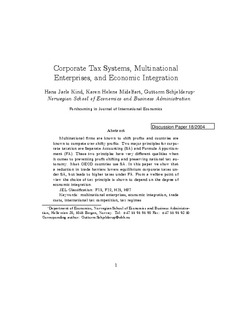| dc.contributor.author | Kind, Hans Jarle | |
| dc.contributor.author | Midelfart, Karen Helene | |
| dc.contributor.author | Schjelderup, Guttorm | |
| dc.date.accessioned | 2006-08-03T07:56:32Z | |
| dc.date.available | 2006-08-03T07:56:32Z | |
| dc.date.issued | 2004-07 | |
| dc.identifier.issn | 0804-6824 | |
| dc.identifier.uri | http://hdl.handle.net/11250/162814 | |
| dc.description.abstract | Multinational firms are known to shift profits and countries are
known to compete over shifty profits. Two major principles for corporate
taxation are Separate Accounting (SA) and Formula Apportionment
(FA). These two principles have very different qualities when
it comes to preventing profit shifting and preserving national tax autonomy.
Most OECD countries use SA. In this paper we show that
a reduction in trade barriers lowers equilibrium corporate taxes under
SA, but leads to higher taxes under FA. From a welfare point of
view the choice of tax principle is shown to depend on the degree of economic integration. | en |
| dc.format.extent | 223186 bytes | |
| dc.format.mimetype | application/pdf | |
| dc.language.iso | eng | en |
| dc.publisher | Norwegian School of Economics and Business Administration. Department of Economics | en |
| dc.relation.ispartofseries | Discussion paper | en |
| dc.relation.ispartofseries | 2004:18 | en |
| dc.subject | multinational enterprises | en |
| dc.subject | economic integration | en |
| dc.subject | trade costs | en |
| dc.subject | international tax competition | en |
| dc.subject | tax regimes | en |
| dc.title | Corporate tax systems, multinational enterprises, and economic integration | en |
| dc.type | Working paper | en |
